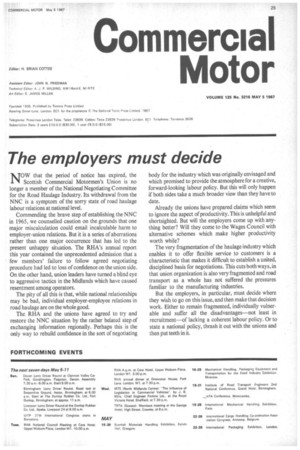The employers must decide
Page 27

If you've noticed an error in this article please click here to report it so we can fix it.
NOW that the period of notice has expired, the Scottish Commercial Motormen's Union is no longer a member of the National Negotiating Committee for the Road Haulage Industry. Its withdrawal from the NNC is a symptom of the sorry state of road haulage labour relations at national level.
Commending the brave step of establishing the NNC in 1965, we counselled caution on the grounds that one major miscalculation could entail incalculable harm to employer-union relations. But it is a series of aberrations rather than one major occurrence that has led to the present unhappy situation. The RHA's annual report this year contained the unprecedented admission that a few members' failure to follow agreed negotiating procedure had led to loss of confidence on the union side. On the other hand, union leaders have turned a blind eye to aggressive tactics in the Midlands which have caused resentment among operators.
The pity of all this is that, while national relationships may be bad, individual employer-employee relations in road haulage are on the whole good.
The RHA and the unions have agreed to try and restore the NNC situation by the rather belated step of exchanging information regionally. Perhaps this is the only way to rebuild confidence in the sort of negotiating body for the industry which was originally envisaged and which promised to provide the atmosphere for a creative, forward-looking labour policy. But this will only happen if both sides take a much broader view than they have to date.
Already the unions have prepared claims which seem to ignore the aspect of productivity. This is unhelpful and shortsighted. But will the employers come up with anything better? Will they come to the Wages Council with alternative schemes which make higher productivity worth while?
The very fragmentation of the haulage industry which enables it to offer flexible service to customers is a characteristic that makes it difficult to establish a united, disciplined basis for negotiations. This cuts both ways, in that union organization is also very fragmented and road transport as a whole has not suffered the pressures familiar to the manufacturing industries.
But the employers, in particular, must decide where they wish to go on this issue, and then make that decision work. Either to remain fragmented, individually vulnerable and suffer all the disadvantages—not least in recruitment—of lacking a coherent labour policy. Or to state a national policy, thrash it out with the unions and then put teeth in it.




















































































































